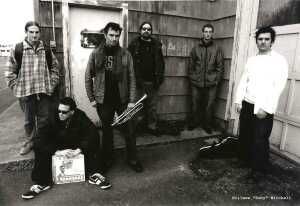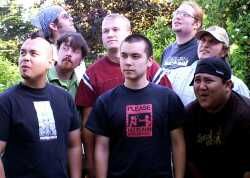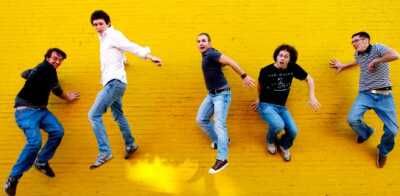
Publisher:
Bonnie King
CONTACT:
Newsroom@Salem-news.com
Advertising:
Adsales@Salem-news.com

~Truth~
~Justice~
~Peace~
TJP
Feb-19-2008 22:10

 TweetFollow @OregonNews
TweetFollow @OregonNews
Bands Bring Hope to Darfur at March 4th OSU Benefit
Bonnie King Salem-News.comThis projects represent GI-Net's mission to directly protect civilians on the ground from genocidal violence.
 The OSU STAND Benefit Concert for Darfur Refugees is March 4th. |
(SALEM, Ore.) - The OSU group STAND is hosting a benefit concert to raise funds to increase civilian protection in Darfur.
The Bands which will play at the March 4th event are "Break as we fall" (Rock, Pop, Funk), "The Badfish Band" (Reggae, Funk), and "Eleven Eyes" (Nu-jazz, Funk, Drum and Bass). The event begins at 7:00 PM located at the MU Ballroom on the Campus of OSU.
All proceeds will go to help the Genocide Intervention Network (GI-Net) fund to ensure African Union Military protection.
Here is some background on Darfur, and GI-Net's involvement:
Civilian Protection in Darfur
As of November 2007, the ongoing attacks carried out against civilians by the government of Sudan and its proxy militia - the Janjaweed - have displaced over 2.5 million Darfurians and resulted in the deaths of as many as 400,000 civilians.
Murder, rape and displacement continue as the world waits for progress in the peace process and deployment of a capable protection force.
The three main threats to civilians in Darfur come from:
- Large scale attacks on villages. While less frequent than in 2003 and 2004, these attacks continue on occasion, and have escalated over the last month.
- Civilians caught between armed combatants, including the government and its militias and rebel groups.
- Janjaweed attacks on people who have already been displaced to camps. The Janjaweed have been paid, trained, and granted immunity for these crimes by the government of Sudan.
All three sources of insecurity are important to address, and doing so will only be possible when a proper political agreement is reached and an effective peacekeeping force is deployed. However, in the meantime, every person can do something to improve the security of Darfur's civilians.
In particular, the violence faced when leaving the camps (for example, to collect firewood) is the most predictable source of violence, and is the threat most relieved by civilian protection projects.
How GI-Net Protects Civilians
GI-Net is the only organization with programs in Darfur focused exclusively on the problem of protecting civilians from further violence. They do this by working with the displaced communities, the African Union, the United Nations, and organizations on the ground.
Flexible and responsive projects have been developed that use the latest information from the ground to best protect civilians.
Through this civilian protection program, GI-Net members and contributors from across the United States and the world have donated over $500,000 to protect those civilians in Darfur who have been subject to violence since the beginning of the genocide.
Below are some examples of the types of ways protection is being provided in five camps in North Darfur.
Women and Firewood
Several programs relate to the need for firewood. Securing firewood is of vital importance. The food provided by aid agencies is inedible unless cooked requiring some kind of cooking fuel. However, firewood is becoming scarce or non-existent around the camps, forcing women further into the desert to dig up roots, a journey which can leave them vulnerable for up to 15 hours at a time.
Within the camps, a robust firewood market offers the necessary fuel to cook without having to risk leaving the camps. All families who can afford to buy firewood do, as it is much less time consuming and allows them to avoid the risk of gathering in the dangerous territories outside the camps.
It is those households unable to afford firewood that are forced to collect it themselves.
Income Equates Safety
By providing families with income generating activities, such as materials for growing vegetables and raising poultry, these families can afford to buy firewood.
 Eleven Eyes |
At a one time cost of only $80, families are provided with the tools to create their own sources of sustainable income. Developing alternatives to firewood GI-Net is developing a model that will allow the most vulnerable women to cook for their households in propane kitchens located in safe areas of the camps.
Focus groups and interviews with women and community leaders in the camps have shown that cooking with propane is a particularly efficient and welcomed alternative - one that many women want and have in some cases used in their homes before being displaced.
For approximately $1 per family per day, a propane kitchen can be provided to the community, keeping them safely within the camps.
Firewood Patrols with the African Union and United Nations Peacekeeping Forces
Through much of 2007, GI-Net worked with displaced communities and the African Union forces on the grounds that it is mandated to provide these armed escorts for women collecting firewood. Unfortunately, due to the enormity of the African Union's task and the security challenges they face, they have not been able to run these patrols beyond a very limited basis.
 The Badfish Band |
With a strong understanding of the challenges the incoming UN force will face in implementing firewood patrols, GI-Net is working with these groups to ensure that the patrols are coordinated with relevant NGOs and the civilian population, and to act as advocates for displaced civilians to pressure the force to follow-up through on their protection commitments.
The cost of administering this program is only about $1 per displaced person who will benefit from it.
Formed Police Units Helping the incoming peace mission Civilian protection must be made a top priority for the incoming hybrid peacekeeping force.
This requires tremendous planning and an understanding of the civilian protection problem so that forces on the ground are able and ready to perform this task.
Together with the Department of Peacekeeping Operations (UN), GI-Net is working on programs to catalyze the necessary planning process. They are bringing together a working group composed of members from the United Nations, African Union, Nongovernmental Organizations (NGOs) to determine how the mission, and particularly the "Formed Police Units" (FPUs), to protect camps and civilians.
 Break As We Fall |
GI-Net is also investigating equipment shortages for these FPUs, which are vital to the civilian protection task. We are working with nations to encourage them to contribute equipment to these units.
The benefit to help offset costs to help Darfur refugees is March 4th at OSU's MU Ballroom. Attendance is free, with a $5 suggested donation accepted at the door. If you would like to make a donation before March 4th, contact: Shawn Hillyer.
Articles for February 18, 2008 | Articles for February 19, 2008 | Articles for February 20, 2008
Quick Links
DINING
Willamette UniversityGoudy Commons Cafe
Dine on the Queen
Willamette Queen Sternwheeler
MUST SEE SALEM
Oregon Capitol ToursCapitol History Gateway
Willamette River Ride
Willamette Queen Sternwheeler
Historic Home Tours:
Deepwood Museum
The Bush House
Gaiety Hollow Garden
AUCTIONS - APPRAISALS
Auction Masters & AppraisalsCONSTRUCTION SERVICES
Roofing and ContractingSheridan, Ore.
ONLINE SHOPPING
Special Occasion DressesAdvertise with Salem-News
Contact:AdSales@Salem-News.com




Salem-News.com:
Terms of Service | Privacy Policy
All comments and messages are approved by people and self promotional links or unacceptable comments are denied.
[Return to Top]
©2026 Salem-News.com. All opinions expressed in this article are those of the author and do not necessarily reflect those of Salem-News.com.